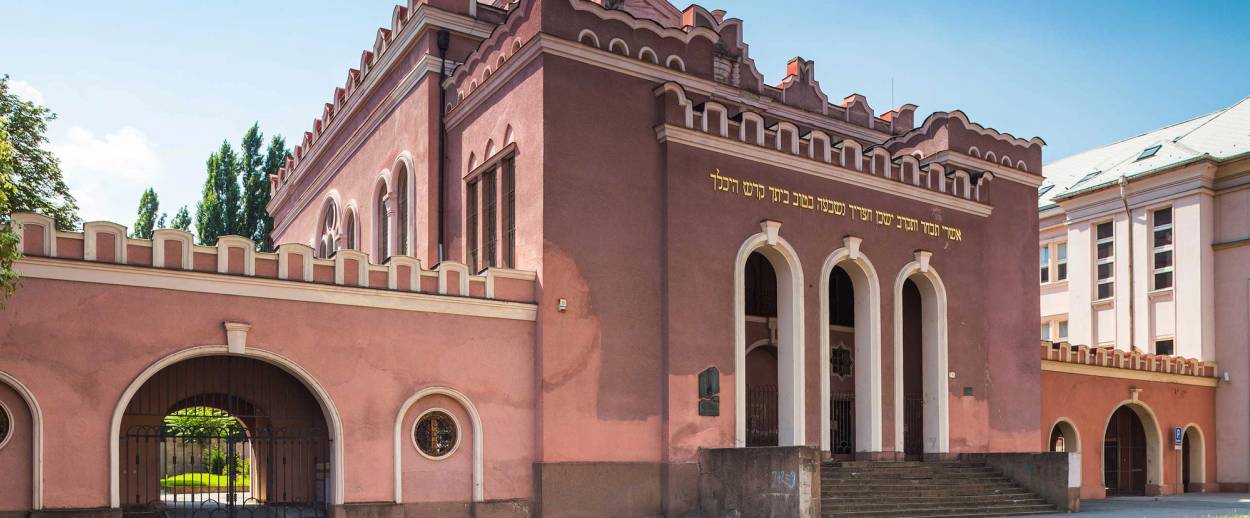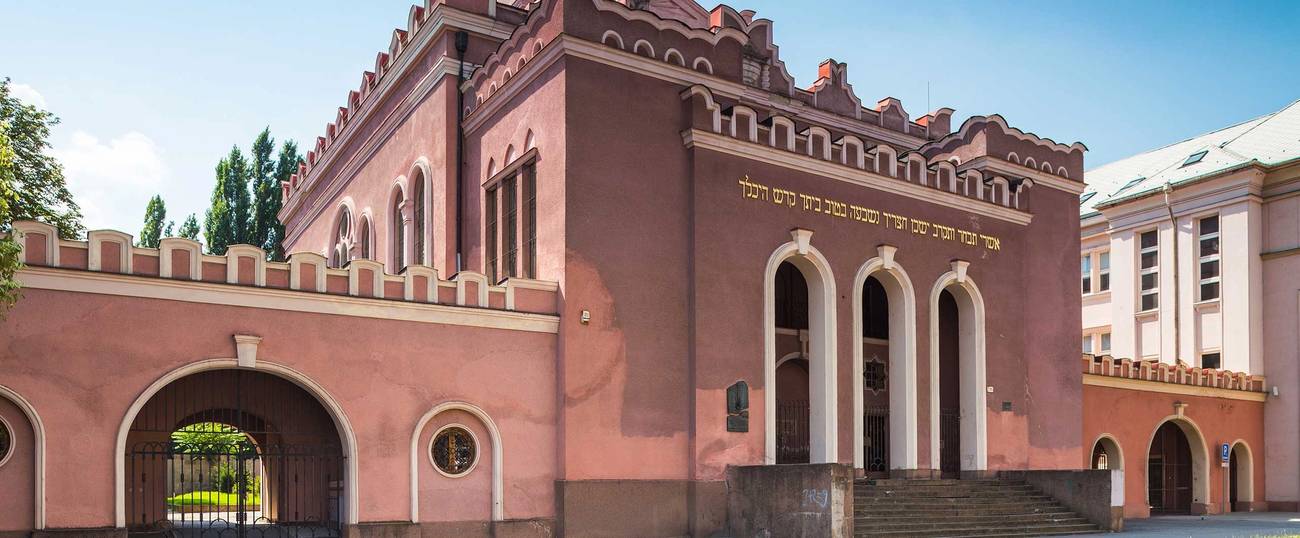Generations of Atonement
For my mother, a Holocaust survivor, Yom Kippur was wrapped up in remorse, mourning, and suffering. I’ve spent a lifetime rethinking what atonement means to me.




One of the most enduring memories of my childhood is walking with my parents and sister on Yom Kippur through the rusted iron gate of our synagogue in Košice, my hometown in eastern Slovakia. My father would put on his yarmulke, open the elaborately carved, heavy wooden door of the men’s section on the ground level, and join the rise and fall of voices chanting the prayers for the Day of Atonement with the age-old tropes that sounded like wailing to me.
My mother, my sister, and I would make our way up a wide stairwell to a cavernous hall with rows of empty pews. Our once-thriving Hungarian Jewish community in Košice was, by the early 1960s, reduced to a small number of families, each with its own legacy of losses. The majestic structure of the sanctuary seemed to be caving in on itself, as if the weight of memory was too much for the ancient walls to bear.
I distinctly remember my mother in her one elegant gray suit with shoulder pads and ankle-length skirt, standing and beating her chest as she murmured the litany of transgressions traditionally chanted during the Yom Kippur service. I remember her fist striking her chest and feeling the weight; this was serious, this was linked with something significant.
My mother died in 1984, but I have continued to attempt to understand the forces that shaped her life, since her life continues to shape mine, just as my life one way or another will continue to shape my daughter’s lives.
*
Acute survivor’s guilt was a throughline in my mother’s eventful life.
During the war, one of her gentile friends offered to hide her and her 8-year-old son—my older brother Robika (the Hungarian diminutive for Robert)—but she was afraid to accept their offer. She felt it was safer to report for deportation. My brother perished, she survived. My sister Susan and I were born after the war.
Although I never knew Robika—whose picture hung above the radio in our one-room living quarters, a red-haired little boy in tailored overall shorts—he was a palpable presence in my life. My mother lived with an unacknowledged fantasy, soaked up by my permeable child psyche, that Robika was alive and some day we would reunite with him. When visiting a neighboring town or on one of our vacations in Hungary, if we were to spot a redhead who was the same age my brother would have been, had he survived, one of us would say: “Do you think it’s him? Should we ask his name?”
I knew that Robika perished. Yet I had secretly invented dozens of ways for his escape, and each time we approached one of these strangers, part of me anticipated a tearful reunion.
My mother’s sacrifice to God for the sin of letting her son die was to remain in exile—emotionally and physically. Only in this case, “exile” meant not leaving home: When, after the war, many of the city’s surviving Jews, including her sister, left for America, she chose to stay behind.
For my mother, atonement meant remorse. Repressed and relentless. Everything that wasn’t gratitude for the gift of being alive remained trapped inside her—until the persistent pressure of unwept tears rose to a level no hypertension remedy could ease. In the last 12 years of her life, repeated strokes left my brilliant mother less and less able to care for herself or even speak, until all she could do was sit silent and unmoving, propped up in a black leather easy chair next to her living room window.
Looking back, I wonder what it was about the image of my mother standing in prayer that carried such weight for me? Was the fantasy of her son’s escape colliding in that moment with the reality of his absence? Did the gesture of beating her chest pierce the veil of denial? Or was she still inwardly imploring God for a miracle of his return?
All I know is that the Yom Kippur of my childhood became the embodiment of penance; the notion that being alive came at a great cost. In response to that credo, somewhere along the way I constructed my own system of checks and balances: The best way to pre-empt disaster or offset joy was to endure a requisite level of self-inflicted suffering.
*
After more years on the analyst’s couch than I’d like to admit, I’ve surrendered to the notion that the child I once was—the small girl who absorbed her mother’s spoken and unspoken testimony—may never vanish. She usually comes tugging at my sleeve, tempting self-sabotage, whenever I’m reaching for one more helping of happiness. She was there wringing her hands before my wedding day. When in my 40s I struggled to conceive a second child, it was her voice that called in a dream warning: “Look at all you have, don’t you dare ask for more!” For decades that child would signal her presence through a hollow feeling in my belly; the sense of having committed a crime, though I couldn’t recall what it was I had done, that warranted punishment.
My mother had a deep love for the spiritual teachings of her Jewish tradition, and an equally deep ambivalence about how much of that love was wise to transmit to my older sister and me. On the High Holidays, she sat bent over the page of her prayer book, yet I never heard her utter a Hebrew word out loud. So it’s not surprising that placing my story within the greater context of my ancestral line was not an easy task for me.
I arrived in America at the age of 19, resolved to immediately dive into Jewish learning. Yet somehow, over 30 years of living in New York City, I could never seem to find a Hebrew literacy class that matched my schedule. Still, I stayed the course, placed language learning on hold, and sampled a number of congregations on Manhattan’s Upper West Side. After our family settled in the Hudson Valley in the summer of 2001, we became members of not one but two welcoming spiritual communities. It was then, through classes and Sabbath morning services that I began to learn what being Jewish—or, as my teacher, Rabbi Jonathan Kligler, likes to say, “doing Jewish”—is all about. These days my library is filled with books of Hasidic tales, mystical Judaism, and sacred text commentaries. My knowledge of Hebrew is still rudimentary, but as I wrap my tongue around the sound, it vibrates and whirs and carries me across the abyss of time, and I feel the wide open palm of my grandfather—a respected Jewish scholar—blessing me.
I’m learning that Yom Kippur can be a communal experience of homecoming, rather than a holiday eclipsed by the burden of self-blame. It’s a day we’re called to turn inward to face our frailties, then turn toward each other discovering that we’re not the only ones who missed the mark this year. Missing the mark is the inevitable consequence of being human. It’s what our pilgrimage is all about: a perpetual invitation to be born into our next not-yet-born self.
For me, the arc of recovery continues. I have the inner and outer resources my mother didn’t have; resources that allow me to step forth to claim my brother not as a ghost of a redheaded little boy who grew up into a tall handsome young man, but as a flesh and blood child whose life was abducted by evil. My mother couldn’t bear to fully embrace the reality of her son’s death. She also didn’t want him to be lost in the sea of unclaimed siblings. So she set the stage for my sister’s and my continued relationship with Robika.
As I grow to trust it, it’s a relationship that has become an illuminating force in my life; a force that spurs me on to retrieve the lost treasures of my spiritual inheritance. For a number of years I wished I could chant the lines from the Torah that my brother would have studied for his bar mitzvah, had he lived, but I didn’t know the exact date of his birth. It wasn’t until Susan traveled to Košice and obtained his birth certificate that I learned that his parsha would have been Vayigash, a portion about Joseph reuniting with his siblings—a narrative that celebrates the redemptive power of forgiveness.
The sages speak about each child coming into the world to mend something in their family line and ultimately in the human family. In essence our lives are meant to be acts of teshuvah; acts of turning toward a deeper and deeper level of healing. Part of unstitching the crippling thread of chronic self-condemnation stitched into my DNA through stories of our family is about shifting my experience of teshuvah from remorse toward radical compassion. As I recite the Vidui, the confessional portion of the Yom Kippur service, I must place my hand over my chest with a gentle tap, acknowledging my frailty while also asserting my essential goodness. To experience life as either an undeserved bestowal or a gift to be earned and celebrated is a choice I must keep making over and over again.
I’m comforted knowing that my ancestors in their wisdom anticipated my need for a Day of Atonement. They roped off a safe space for voicing my real and perceived transgressions not to dole out punishment but to remind me of my true untainted nature. I’m stepping into God’s corner office on Yom Kippur not because I’m being called on the carpet but because someone cares enough to encourage my growth.
Not long ago, sorting through photographs from my childhood, I came across a snapshot of a summer outing with my mother and my sister Susan: an idyllic scene in the countryside. I’m 3 years old, sitting absorbed in play. My mother, dressed in a fashionable skirt and matching jacket, looks serene. My chubby 3-year-old hand is resting on her thigh. That picture was a reminder that although there was much darkness in my mother’s life, there was also a plenitude of light. It is the deep well of her love that sustains me as I keep the essential questions of her life alive in me.
***
Like this article? Sign up for our Daily Digest to get Tablet Magazine’s new content in your inbox each morning.
Julia Indichova is the author of Inconceivable and The Fertile Female. One-Heart Revolution: The Perils of Positive Thinking is due in the spring of 2019